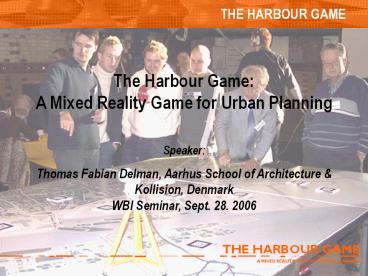THE HARBOUR GAME PowerPoint PPT Presentation
1 / 20
Title: THE HARBOUR GAME
1
THE HARBOUR GAME
The Harbour Game A Mixed Reality Game for Urban
Planning Speaker Thomas Fabian Delman, Aarhus
School of Architecture Kollision, Denmark WBI
Seminar, Sept. 28. 2006
THE HARBOUR GAME A MIXED REALITY GAME FOR URBAN
PLANNING
2
CONTEXT
- Context of the project
- Aarhus is the second largest city in Denmark with
300.000 inhabitants - The port of Aarhus is one of the busiest in
Northern Europe - A new plan for the utilization of central harbour
areas in Aarhus was in the making - Traditional planning approach and process
initiated by the municipality
3
PROJECT TEAM
- The project team
- We wanted to challenge the municipality's
approach by actively engaging a wider range of
participants - A multidisciplinary project team consisting of
architects, process and usability consultants,
political scientists and programmers. - A collaboration between private companies,
researchers from the University of Aarhus, the
Aarhus School of Architecture sponsors from the
public and private sector
4
CHALLENGES
- Challenges in deliberative urban planning
- Traditionally planning is viewed as an expert
discipline - In deliberative planning all voices must have an
equal say - Planning is a complex discipline governed by hard
soft constraints which must be taken into
account - Deliberative planning is (still) ruled by the
experts who introduce rational arguments as
opposed to emotional
5
LEVEL THE PLAYING FIELD
- Games can level the playing field
- Games as a communication space based on rules
where qualified professionalism meets the
knowledge and interests of citizens and create a
basis for mutual understanding - Realistic gaming simulations support expert
planners whereas simple games accommodates
broader participation - Dilemma how to address complex problems using
simple games?
6
EXPERIENCE, LEARN CONTRIBUTE
- Our approach
- Deliberative, game-based planning as a
three-legged creature experience, learn
contribute
7
PRIMARY GOALS
- Primary goals of the Harbour Game
- Engage different interest groups by giving them a
novel fun experience - Let all participants leave with a sense of the
complex issues involved in urban planning - Let all participants contribute to the planning
process at the vision formulation stage
8
SETUP
- The setup of the game
- Data collected previously presented as
posters/project cards - 4 teams/4 members each team had to agree on a
strategy beforehand - A board makes the game accessible to more players
simultaneously - Physical artefacts contain information relation
which makes the process and the debate more
tangible - Simple rules present project, place marker,
other teams can support or suppress a project - Based on deliberative debate supported framed
by the rules
9
PROJECT POSTERS CARDS
PROJECT POSTERS
9
THE HARBOUR GAME A MIXED REALITY GAME FOR URBAN
PLANNING
10
STRATEGY IN THE MAKING
STRATEGY IN THE MAKING
THE HARBOUR GAME A MIXED REALITY GAME FOR URBAN
PLANNING
11
THE BOARD PROJECT MARKERS
THE GAME BOARD
THE HARBOUR GAME A MIXED REALITY GAME FOR URBAN
PLANNING
12
DEBATE
DEBATE
THE HARBOUR GAME A MIXED REALITY GAME FOR URBAN
PLANNING
13
DEBATE
PLAYING THE GAME
THE HARBOUR GAME A MIXED REALITY GAME FOR URBAN
PLANNING
14
TECHNOLOGY
- The technology of the game
- Allowed us to overlay the physical markers with
digital information - Allowed us to automatically keep score
- Allowed us to keep track of contributions more
easily - Made it possible to present the contributions in
an ordered fashion afterwards - Cheap hardware open source software
- Is NOT a prerequisite for using games in urban
planning!
15
SIMPLE TECHNOLOGY
THE HARBOUR GAME A MIXED REALITY GAME FOR URBAN
PLANNING
16
OUTCOME
- The outcome of the game
- Players spectators were quickly engaged in
playing the game - New alliances were formed across traditional
divides - The pure players had fun but were unrealistic,
the serious people were realistic but had no fun
the serious players had fun and created
realistic visions - As an event for creating interest in urban
planning the game was a success as a tool for
actual planning there is still some way to go
17
DEBATE
PRESENTING THE RESULTS
THE HARBOUR GAME A MIXED REALITY GAME FOR URBAN
PLANNING
18
DEBATE
AT THE HARBOUR
THE HARBOUR GAME A MIXED REALITY GAME FOR URBAN
PLANNING
19
DEBATE
AT THE HARBOUR
THE HARBOUR GAME A MIXED REALITY GAME FOR URBAN
PLANNING
20
THANK YOU
Thank You for listening! More info at
www.havnespil.dk (mostly in Danish) Contact
thomas_at_kollision.dk THE HARBOUR GAME WAS MADE IN
COLLABORATION WITH UNIVERSITY OF AARHUS, AARHUS
SCHOOL OF ARCHITECTURE, THE PROJECT TEAM HAVNEN
PÅ SPIL KOLLISION
THE HARBOUR GAME A MIXED REALITY GAME FOR URBAN
PLANNING

